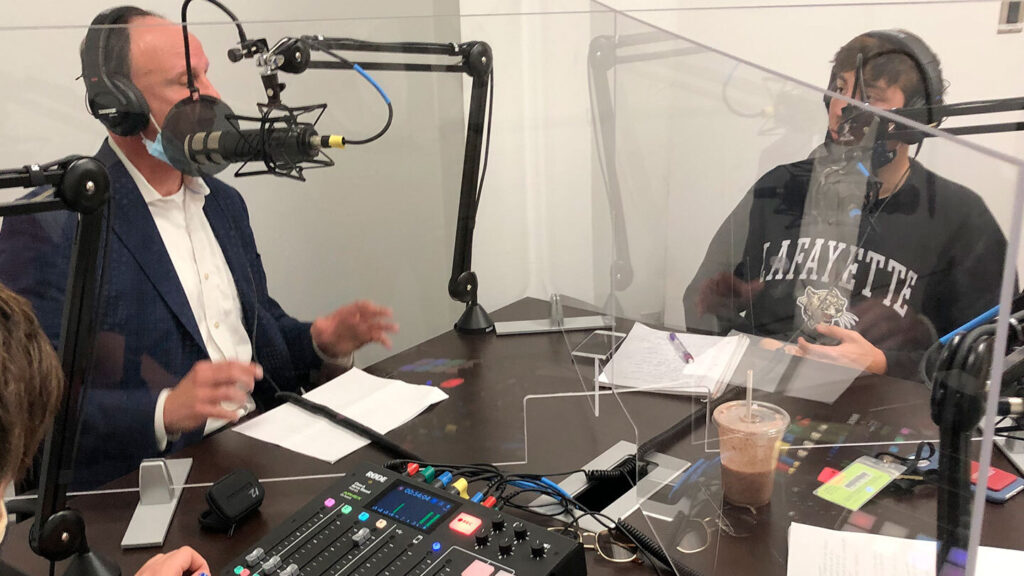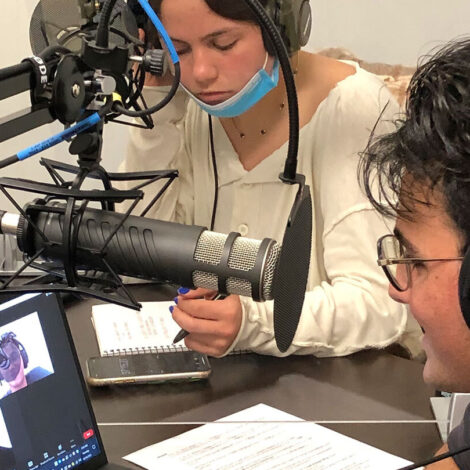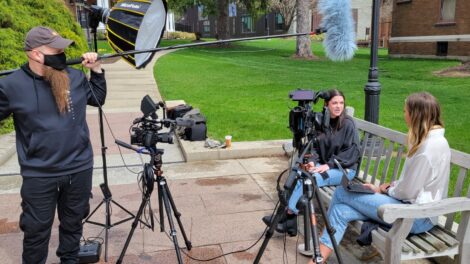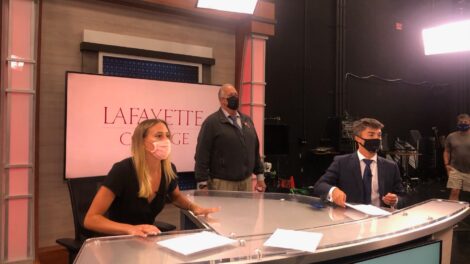Nine alumni step up to the mic for interviews with first-year seminar students
By Bryan Hay
For nearly a decade, Prof. Mark Crain has led his students in the production of professional quality video essays, thoroughly examining a range of weighty topics with local, regional, and national subject area experts in partnership with a local public television station.
Access podcasts here
For the first time, Crain, William E. Simon Professor of Political Economy and chair of policy studies, tasked his first-year seminar students to diversify the mode of delivery by producing a series of podcasts. Produced in collaboration with Lehigh Valley Public Media, the series features interviews with nine alumni.

Sean Bluni ’90 with Sebastian Bjorkeson ’25
Crain’s students received professional coaching from David Barasoain, podcast producer and director of radio production for National Public Radio’s Atlanta affiliate, who met remotely with Crain’s students.
Barasoain reviewed their proposed questions and helped them think about and refine their approaches to get the best interviews possible. Students worked in teams, interviewing nine alumni identified and recruited for the podcast series by Chad Davis, executive director of alumni engagement and annual giving, and his staff.
Davis offered the students an impressive, engaging lineup of alumni to get the Past, Present, and Future: Interviews by Current Lafayette Students with Notable Alumni series off to a successful start:
Chris Caine ’78, president and CEO, Mercator XXI; Angel Mendez ’82, executive chairman, board of directors, LevaData; Amanda Pisetzner ’10, senior editorial producer, Vice Media; Tim Hylan ’88, vice president, Internal Medicine Field Medical Director Group at Pfizer Inc.; Samantha Jordan ’13, foreign service officer, U.S. Department of State; Sean Bluni ’90, CEO, Hardesty & Hanover, LLC; Katherine Mulready ’04, senior vice president and chief strategy officer, Colorado Hospital Association; Oliver Bowen ’05, digital systems architect, Perceptive; and Kevin Mandia ’92, CEO and board director, Mandiant.
As he listened intently to Crain’s students describe their outlines and lines of questioning, Barasoain advised them to dig deeper, finding richer, more tactile textures to lift the content from something one-dimensional into a compelling story.
He urged the students to cut content that may have seemed valid and relevant on a first draft and instead rely on their instincts.
“Go with the best stuff first,” said Barasoain, who encouraged students to consider carefully those icebreaker questions that will set the mood and pace of the conversation.
For the interview with Mulready, he suggested asking how her background in religion, political science, and American history led to a career with a nonprofit organization and her interest in developing health policy, including the Affordable Care Act.
Don’t miss the details; always ask interview subjects to confirm the spelling of their names and their company’s information, Barasoain said.
“Go for specific examples,” which will demonstrate to the interviewee a high level of preparation and care, Crain offered. “You’ll get better answers.”
Acting on the advice, Matt Luongo ’25 and Molly Terraciano ’25 talked easily and naturally with Mulready about what took her down her career path.
Christopher Rubayo ’25 and Ella Kenyon ’25, who would interview Jordan, changed course on their proposed questioning when Barasoain asked them to consider how Jordan’s fluency in multiple languages may have helped advance her career. Think also about questions that would reveal who inspired her at Lafayette, or her earliest mentors in life, he said.
Crain suggested asking about how changing international relationships with the U.S. might affect her work as a foreign service officer and if she could share an example of a crisis she helped resolve.
“You are creating a bridge of empathy between you and the listener,” Barasoain said.
By the end of the session, Barasoain had sufficiently challenged Crain’s students, who furiously took notes and adjusted their scripting.
Jessie Whitman ’22, who produced the video essay last spring on Lafayette Lens, served as the project manager for the podcast series and assisted Crain in its production.
“Because this was our first time doing a project like this, I particularly loved assisting in shaping a framework that will hopefully continue for years to come,” Whitman said. “Prof. Crain and I started with an abstract idea and over the course of 15 weeks, made it into something tangible with clear guidelines, structure, and expectations.”
Their hope, she said, is that the series can be easily replicated each year in a streamlined fashion.
“I’m eager to see how this podcast shapes the Lafayette student–alumni relationship,” Whitman added. “It’s refreshing to hear first-year students, who have so much ahead of them, speak with such established professionals. I think listeners will agree that there is a special sort of juxtaposition there.”
“This was a challenging assignment, combining editorial and technical details, but the students persevered and delivered strong content,” Crain said. “My thanks to Chad for lining up distinguished alumni with a variety of interesting career paths.”
“My thanks, too, to David for his valuable coaching and to Christine Dempsey, senior vice president of radio at Lehigh Valley Public Media, for attending all recording sessions and advising on the editing process,” Crain added.
Crain, along with Nicole Crain, who is now professor of economics at the National Defense University, formed a partnership with PBS39 in 2012 to produce coverage of the national elections. The partnership expanded since then and now includes Lafayette Lens, an hourlong series covering issues of global importance, and collaboration on the new podcast series.
Links to all editions of the broadcasts are available on the policy studies website.



